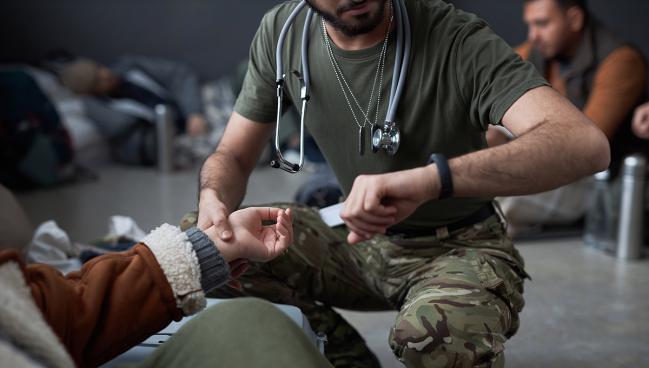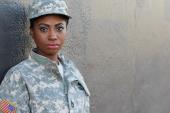The Cardiovascular Consequences of War
For both civilians and military veterans, war destroys health infrastructure and has profound effects on CV risk factors.

The destructive impact of war is far-reaching, and at a time when there are multiple major ongoing conflicts across the world, a paper published recently in the European Heart Journal has put the spotlight on direct and indirect effects on cardiovascular health.
“Warfare is the antithesis of global health. . . . Health and peace go hand in hand,” write Rasha Kaddoura, PharmD, and Mohammed Al-Hijji, MD (both from Heart Hospital, Hamad Medical Corporation, Doha, Qatar).
The paper, which provides an overview of research into links between war and cardiovascular risk factors/disease in both civilians and military veterans, grew out of a desire to help in some way as conflicts rage in Ukraine, the Middle East, Africa, and elsewhere, Kaddoura told TCTMD.
“Since I'm working in a cardiology setting, and I have more experience in that, maybe this is a way for me to express that we have [cardiovascular health] consequences—not only the actual trauma, not only the direct issue of the war,” she said. “There are cardiac issues that people will be facing for years to come.” This impact, said Kaddoura, extends across all ages and walks of life among the people—including healthcare workers—exposed to the fighting, not just military personnel in combat.
T. Sloane Guy, MD (Northeast Georgia Health System, Gainesville), a past member of the American College of Cardiology’s cardiac care team council and a US Army veteran who served as a trauma surgeon in Afghanistan and Iraq, stressed that in addition to its civilian impact, war also exerts a profound influence on the cardiovascular health of military veterans, regardless of which country they serve.
“The idea that combat veterans have a higher incidence of cardiovascular disease is not a new one, but it probably deserves renewed emphasis given the number of conflicts that we’ve had recently in the world,” Guy commented to TCTMD.
The link has been well established in prior studies mostly conducted in veterans from the World War II and Vietnam War eras, he said. “Now we’re dealing with a new generation of veterans from the wars in the Middle East and elsewhere that need to be attended to and dealt with, so it’s good to refresh in clinicians’ memories that cardiovascular disease is a problem that’s particular to that population of people.”
Varied Cardiovascular Concerns
In the paper, Kaddoura and Al-Hijji describe the impact of warfare on both physical and mental health over the short and long term, a situation that’s exacerbated by disruptions to the delivery of cardiovascular care and services during active conflicts stemming from damage to the environment, infrastructure, and facilities.
Conventional weapons and weapons of mass destruction have widespread effects, particularly among military personnel. Combat-related trauma, for instance, has been associated with a variety of cardiovascular risk factors and diseases, including hypertension, metabolic syndrome, diabetes, arterial stiffness, lower coronary flow reserve, CAD, and coronary heart disease-related mortality.
Exposure to chemical weapons has been linked to hypertension, diabetes, coronary heart disease, and post-traumatic stress disorder, whereas radiation exposure among survivors of atomic bomb blasts has been accompanied by increases in CV risk factors and disorders.
There are cardiac issues that people will be facing for years to come. Rasha Kaddoura
In general, civilians in war zones have been shown to have high rates of hypertension, diabetes, and CVD.
“War impacts individuals from infancy to adulthood and its effect is long-lasting even after it ends. Furthermore, access to health services (eg, emergency, medical, surgical, mental, maternal, and immunization) is limited due to the destruction of the healthcare infrastructure and the severely drained resources,” Kaddoura and Al-Hijji write.
There are also ripple effects to parts of the world not directly involved in active battles.
Kaddoura noted that although Qatar is not involved in the ongoing conflicts, she has colleagues whose family members have been killed in Gaza. She also recently spoke with a patient who had survived an MI and undergone surgery but was not progressing well—it turned out he was worried about his daughters living in that war-torn area.
“Without seeing people, talking to people, you still sometimes do not comprehend what is going on, what is really the issue, what is really the suffering,” Kaddoura said.
These types of issues all play into warfare’s damage to cardiovascular health and should be considered when discussing both the prevention and treatment of heart disease, she indicated.
Although evidence linking military service and cardiovascular health is not likely to affect wartime decisions, “it will impact the way we provide care for veterans after wars, which is obviously something that I think most Americans value,” Guy said. “For those that are involved in caring for veterans, whether they be in the Veterans Administration system or in civilian practices and hospitals, there needs to be an awareness that being a veteran is a risk factor for cardiovascular disease and a heightened awareness of that when surveilling them.”
The medical community might want to be more aggressive about cardiovascular prevention in military veterans, and it would be reasonable to consider different thresholds for initiating medications like statins in this population, he said.
About military veterans, Guy said, “I think that most Americans believe, as they should, that that small group of people [are individuals] that we as a society have a higher obligation to, to meet their medical needs. Cardiovascular disease is certainly one element of that, and we should do everything we can to provide care for those who went to war so that others did not have to.”
Kaddoura said she hopes this paper will help raise awareness about this issue as one potential consequence of war and “shed some light that the political situation has to improve for the benefit of everyone.”
Todd Neale is the Associate News Editor for TCTMD and a Senior Medical Journalist. He got his start in journalism at …
Read Full BioSources
Kaddoura R, Al-Hijji M. The multifaceted impact of warfare on cardiovascular health. Eur Heart J. 2024;45:3904-3907.
Disclosures
- Kaddoura and Al-Hijji report no relevant conflicts of interest.






Comments